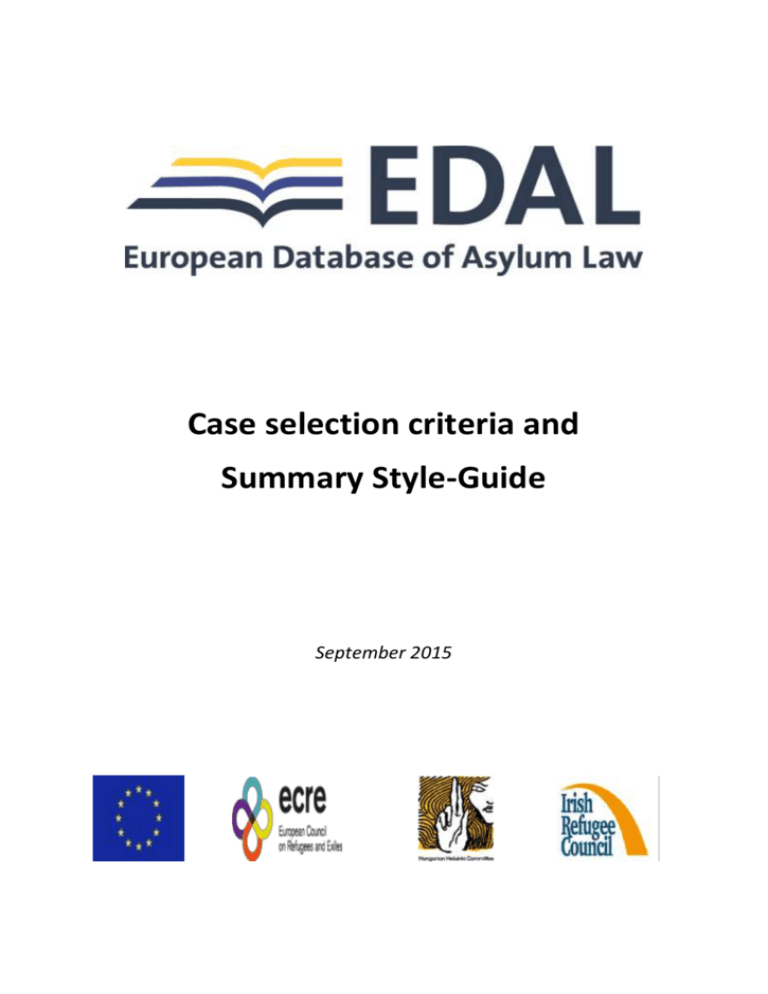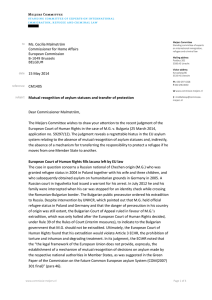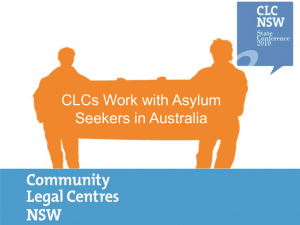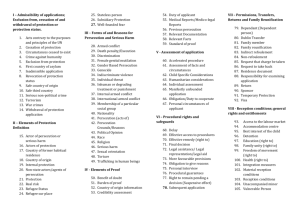EDAL Case selection criteria and Summary Style
advertisement

Case selection criteria and Summary Style-Guide September 2015 Contents Introduction ............................................................................................................................................ 1 Aim of the Database – Target Audience ................................................................................................. 1 EU Directives & Regulations Included ..................................................................................................... 1 National Experts ...................................................................................................................................... 2 Guiding Principles for Case Selection...................................................................................................... 2 Style Guide .............................................................................................................................................. 4 Using keywords ....................................................................................................................................... 4 Case Summary Template ........................................................................................................................ 4 Country Overview ................................................................................................................................... 5 Introduction The European Database of Asylum Law (EDAL) is an online database containing case law from 17 EU Member States interpreting refugee and asylum law. National Experts are recruited in each member state to select appropriate cases, to summarise and tag them and upload them to the database. EDAL summaries are prepared in the judgments’ original language, are translated into English and a link is provided to the original judgment where available. Aim of the Database – Target Audience The case-law hosted on EDAL is of benefit both domestically in the countries concerned and at the European level. In some countries EDAL is making national jurisprudence available on-line for the first time in an open and flexible format. More generally the database aims to promote the harmonisation of Member States’ interpretation of EU Directives and Regulations and to foster deeper cooperation between practitioners across the EU. Its primary audience is decision-makers at all levels, policy makers, NGOs, legal practitioners and employees of relevant State, European and International bodies and agencies. EU Directives & Regulations Included 1. Asylum Procedures Directive 2005/85/EC and 2013/32/EU 2. Qualification Directive 2004/83/EC and 2011/95/EU 3. Reception Conditions Directive 2003/9/EC and 2013/33/EU. In some countries, this Directive involves an analysis of jurisprudence dealing with labour law and administrative decision-makers, separate from asylum decision making bodies. These decisions are only relevant where they clearly fall under the criteria specified below. 4. Family Reunification Directive 2003/86/EC – this Directive does not apply only to refugees however its interpretation generally will assist equally in its application in refugee cases. By way of derogation from Article 8 the first sub-paragraph does not apply to refugees nor does the third subparagraph of Article 4, paragraph 1; cases relating specifically to these provisions may not be relevant to refugee cases. 5. Returns Directive 2008/115/EC – this Directive is general in its application and does not have any specific nexus to the refugee and subsidiary protection process. Cases concerning this Directive may be omitted from consideration unless, in the opinion of the National Expert, it has a particular significance and bearing on the situation of protection applicants. 6. Dublin Regulation 343/2003 and 604/2013 - The Dublin III Regulation generates a great deal of jurisprudence which is frequently fact specific, is developing quickly and emanates from several administrative bodies. EDAL accordingly focuses primarily on cases regarding the implementation or interpretation of the Regulation itself or that follow or consider significant ECtHR or CJEU cases such as: Case C-245/11 K v Bundesasylamt; C-493/10 N.S. v Secretary of State for the Home Department; C-411/10 M.E. and others v. Refugee Applications Commissioner; ECtHR Application No. 30696/09 M.S.S. v. Belgium and Greece. 1|Page Cases relevant to these instruments may not cite them directly however they will be included on EDAL where they are centrally applicable to the substance of the case; the relevant provisions are tagged under the term “EU Legal Provisions Applicable”. Cases relating to other legislative instruments, e.g. the Trafficking Directive, are also included on an exceptional basis where of fundamental importance to the consideration of the CEAS. National Experts EDAL National Experts are required to have an in-depth knowledge of the national jurisprudence, laws and procedures of their respective countries but also to be generally familiar with the cases already hosted on EDAL. This is essential in order to: Avoid duplication; Identify and summarise cases which overturn, distinguish or otherwise controvert a case already hosted on EDAL Develop consistency and comparisons within and across jurisdictions. A thorough familiarity with EDAL keywords and the provisions of the CEAS instruments are also essential to correctly classify summaries and to tag summaries correctly so as to encourage crossjurisdictional comparison. Guiding Principles for Case Selection A. Cases selected must have a significant jurisprudential impact i.e. where a significant point of law is discussed and the reasoning of the decision-maker is evident and instructive. This can include, for example, cases that have contributed to policy changes at the national level. It is important to ensure that cases are selected on this basis, whether or not they are considered to be pro- or anti- applicant so that the database maintains an accurate and balanced view of jurisprudence at a national level. B. Cases chosen may: Indicate an evolution or regression in the national interpretation of an EU provision; Reaffirm the domestic interpretation of an EU provision; Address the application or interpretation of a controversial or rarely examined EU provision; Potentially serve as a positive or negative example for other States; Be decided based on provisions of national law which differ from EU norms; Be explicitly influenced by or refer to decisions from other EU jurisdictions; Examine the extent or method of transposition of elements of the EU acquis into the domestic legal order. C. Cases should reflect decisions of the ECtHR and CJEU, where relevant. They might: Be based on or implement a specific European decision; Indicate divergence from a specific European decision; Be likely to give rise to a ECtHR or CJEU application/reference from the national level; Examine how case law of the ECtHR & CJEU is interpreted by national courts; and/or 2|Page Follow-up on a ruling of the ECtHR or the CJEU. D. Cases may highlight protection gaps in Member States or demonstrate instances where Member States have maintained higher standards than required by EU law. It is also important to keep in mind other sources of asylum and refugee law in Member States. For example, every Member State is a signatory to the 1951 Geneva Convention on the Status of Refugees while many have ratified UN treaties such as the UN Convention against Torture. Important cases regarding the application of UNHCR Guidelines should also be represented. E. Cases should NOT be: Limited to decisions of higher courts. Provided the jurisprudential impact of the decision is likely to be significant and contribute to a pan-European understanding of the EU asylum acquis, cases from tribunals or semi-judicial bodies may be considered along with those of higher courts. However, as the database hosts case law, first instance decisions of administrative bodies are not included. Cases of lower courts or tribunals which present an interesting point of law and are subsequently overturned by higher courts can be included where clearly notated that the decision was overturned. Concerned solely with country-specific Country of Origin Information (COI). Case law which addresses how decision-makers approach or assess COI may be included, for example, where decision-makers set down clear principles that should be applied in assessing COI. The database is a repository of cases that deal with points of law rather than fact. Concerned solely with a case-specific assessment of credibility. Cases in which a significant proportion of the decision is devoted to assessing credibility will generally not be of value and do not normally interpret provisions of EU law. However, cases which elaborate principles on the burden and standard of proof and the benefit of the doubt, or that set out the test to be fulfilled by applicants will be of interest and may be included. Interlocutory or other decisions which do not contain any point of law. 3|Page Style Guide As the database is aimed at a diverse, EU wide audience the language used should be accessible to all users. The following guidelines apply: Ensure the wording is clear and succinct throughout the case summary and that the summary is structured and organised; Avoid long-winded constructions, for example, ‘Justice X held the opinion that...’ or ‘The court considered if...’; Avoid using Latin terms; Avoid terminology and legal phraseology that is country specific e.g. UK and Irish case summaries should be as accessible to those familiar only with civil law systems; Use the phrase ‘applicant from country x’; Use phrase ‘the applicant’ rather than ‘Mrs. X’; Use positive statements and avoid passive statements where possible; Ensure consistency and accuracy in describing the case and person involved as an application, appeal etc. and an applicant, appellant etc. Completely anonymise the summary by removing all references to the applicant’s name, address and the name or address of persons with whom they are staying or otherwise associated; The original judgment where uploaded/linked to must also be completely anonymised in conformity with EU law as well as to the standard required by the relevant domestic legislation. Case summaries should not exceed 1000 words unless absolutely necessary and may never exceed 1350 words. Summaries do not need to address every aspect or issue in the selected case but should address those that are significant and relevant to the aims of the database. Using keywords Accurate and consistent use of keywords is essential for maintaining a degree of consistency between cases and to develop links to CEAS terminology, which facilitates comparative analysis. EDAL’s keywords have all been derived from terminology used in the Directives and Regulation or other official sources such as the UNHCR and the IOM. They must be used in the headnotes and body of each case summary. So for example, the term ‘unaccompanied minor’ should be used instead of the term ‘separated children’, ‘accommodation centre’ instead of ‘reception centre’ and ‘Internal protection’ not ‘Internal flight alternative’ etc. Case Summary Template A specific template is provided for the preparation of case summaries. National Experts are required to follow this template strictly in order to ensure consistency across the database. Work is already underway on the backend to the website which when completed will facilitate the direct uploading of a summary online using the same format. 4|Page Country Overview Country Overviews provide an outline of national legal frameworks relating to asylum and subsidiary protection applications, determinations and appeals, including the following points: On arrival, where do individuals lodge asylum applications (at the border agency, with immigration officials or police, with a designated asylum agency/office)? Can individuals make applications in detention? Explanation of the respective Civil Law or Common Law System. Administrative or Judicial Asylum Decision-Making Bodies: structure, composition, functioning, adversarial system, inquisitorial system. Appeal structures and mechanisms. Suspensive effect of appeals. Right to Legal Representation and access to Legal Aid. Any particular legal terms which appear regularly in relevant case law and are countryspecific. Country Overviews require periodic review to ensure they are up to date, especially in light of the recasting of CEAS legislation. Amendments need to reflect, for example: Changes made in national level structures as a result of national or international developments or; Measures to sign up to and transpose the original and recast Directives and Regulation. 5|Page







